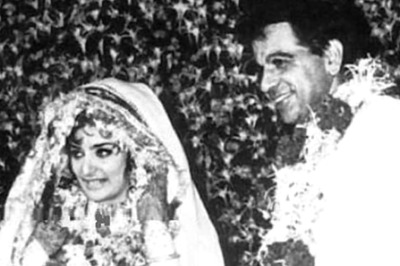
views
New Delhi: Soon after Gotabaya Rajapaksa was declared the winner of Sri Lanka’s Presidential election, Xi Jinping was among the first world leaders to call the President-elect. The Chinese President was no doubt ecstatic that the Beijing-friendly Rajapaksa brothers were in the driver’s seat. But much before Xi picked up the phone, Prime Minister Narendra Modi was quick to call. PM Modi went a step further than Xi and tweeted a congratulatory message in Sinhalese. But to counter China's increasing role in its backyard will take more work than two Sinhalese tweets. And India has already swung into action with External Affairs Minister S Jaishankar flying out to Colombo a day after Rajapaksa took charge.
Gotabaya was the defence secretary of Sri Lanka when his brother, the then President Mahinda Rajapaksa, was leading the final assault against Tamil separatists during the Sri Lankan civil war. During the decade-long rule by Mahinda Rajapaksa, Sri Lanka had a decisive pro-China tilt. While the Sirisena-Wickremesingh government had tried to balance relations with both Asian giants and correct the pro-China tilt, a Rajapaksa presidency threatens to disrupt that balance. After all, China is said to have financed Mahinda Rajapaksa's last campaign. With China invested in Sri Lanka’s elections, India does have reason to worry.
After Sri Lanka failed to repay a Chinese loan, the island nation had to lease the Hambantota port for 99 years. India has raised concerns of China engaging in this kind of debt-trap diplomacy in its neighbourhood. Jabin Jacob from the Department of International Relations and Governance at Shiv Nadar University said India was right to raise these concerns. "Economic distress in its neighbours has direct and indirect political and economic consequences for India too," he said.
So why is it that despite falling into China's debt trap, Sri Lanka continues to fall back on the Chinese? "Quite simply because China also provides political support and leverage. Economically, the Chinese provide an alternative and a speed of action that few countries, least of all India, can match," Jacob said.
Col. (Retd.) R Hariharan, who served as the head of intelligence for the Indian Peacekeeping Force in Sri Lanka from 1987-90, said China's plans in the island nation have been decades in the making. “China has been whittling down India’s geo-strategic advantage in Sri Lanka and Indian Ocean Region (IOR) in the last two decades. China's influence made a quantum jump during President Mahinda Rajapaksa’s decade-long rule that ended in 2014. Since then, China has tightened its stranglehold on Sri Lanka's economy and limited strategic autonomy. The incoming President has little option but to keep up the good relations with China, particularly as the Colombo Port City project is completed and opens for business.”
This demonstrates the strategic importance that China places on Sri Lanka. Jacob explained, "Sri Lanka’s geographic location is crucial to China’s maritime interests and strategy in the Indian Ocean. Plus, the country’s political dynamics also create a natural suspicion about Indian intentions which the Chinese find useful to exploit."
During the civil war, Gotabaya became synonymous with alleged war crimes and a phenomenon known as white van disappearances. The two brothers are hailed as strongmen by the country's Sinhala majority but minorities have been anxious about their rise to power. The Tamil National Alliance (TNA), Sri Lanka's primary Tamil party, had even endorsed his opponent Sajith Premadasa. Naturally, Gotabaya's history will mean India's Dravidian parties have a deep distrust of him and his brother, who is effectively seen as having the remote control of the newly elected government.
And yet, India has a historic opportunity to correct the imbalance though it will have to be done with a great deal of sensitivity. India will have to correct the image that it backed the wrong horse in Premadasa. "(India will have to) Show greater respect and sensitivity to Sri Lanka as a neighbour. Keep promises. At the same time, India must avoid the temptation to behave like China and turn a blind eye to human rights issues," Jacob said.
India's development outreach in the region has not gone unnoticed. India has funded a housing project which involves the construction of 1,200 houses in war-torn Northern Sri Lanka. India also funded the Jaffna Cultural Centre, a commitment of the Indian State towards the Tamil cause. "India's development outreach," said a senior government source, "is need based. We ask partner countries what they need. Unlike China, we don't impose projects on our neighbours."
Another senior government source said, "India cannot match the deep pockets of the Chinese, but we can counter them with cultural diplomacy and soft power. We can also leverage our proximity to Sri Lanka."
Jacob agrees. "India’s greatest leverage (vis-à-vis Sri Lanka) is its geographic proximity and economic and political influence in the island nation. These need to be leveraged of course, with greater finesse and sensitivity than New Delhi has so far."
And yet, there may be an alternative to this scenario of confrontation — India and China may end up cooperating in the region with Sri Lanka as a bridge for the two Asian giants. Col. Hariharan said, "Sri Lanka has the potential to become the unwitting partner in the India-China power play. It is not as bad as it sounds because Sri Lanka can also become the meeting ground for both the big Asian countries to mend their relations.”




















Comments
0 comment